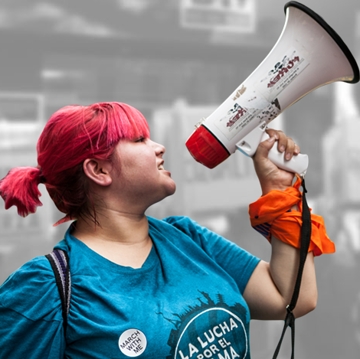
Throughout 2017, the Submittable blog has celebrated grants organizations using our platform to facilitate meaningful giving. In this time of renewed political engagement, the work of North Star Fund stands out. Founded in 1979, North Star Fund is a NY-based community foundation that works to comprehensively support grassroots activism and organizing, funding many local groups dedicated to a variety of issues (food justice, housing, education, police reform, civic engagement and Black-led organizing, to name a few). We’re excited to share a conversation with Jennifer Arieta, Program Officer for North Star Fund.
All pictured organizations received funding from North Star Fund in 2016.
How do you define grassroots?
I think you have to begin with who makes decisions, and if there is meaningful participation around decision making throughout all levels of an organization.
North Star Fund was founded to practice social justice philanthropy differently. Our goal is to flip the script on who has power and who gets to make choices regarding where resources go. We fund people in the five boroughs and also in Hudson Valley/upstate NY — residents trying to make change for themselves.
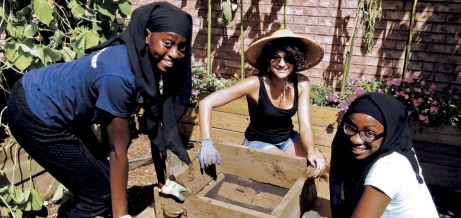
Grassroots Action Grant: Resilience Advocacy Project is breaking the cycles of intergenerational poverty by training low-income youth to develop, launch, and lead campaigns in their communities.
Traditionally in a foundation, a program officer evaluates materials, goes on site visits with grant applicants, and then presents to the board of trustees. North Star Fund practices activist-led grantmaking instead. We engage a team of people who are doing work in the field to read grant proposals, go on site visits and, collectively, pick who to fund. Decisions come completely out of this community-driven process.
My role as program officer is to hold space for this, to maintain relationships with our communities, and assist them in the process of applying for grants. I also come from the field and a lot of program officers at North Star traditionally have come from the field (I used to be a community organizer).
Measuring outcomes for activism seems like it would be challenging. How does North Star Fund approach that?
When you’re evaluating an organization, you don’t know when a political moment or movement will strike, so the long-term investment in work that’s grassroots has tremendous value.
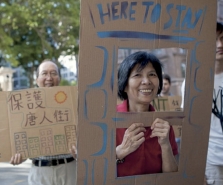
Movement Leadership Grant: CAAAV empowers poor and working-class Asian immigrants and refugees with information about rent laws, regulations, and most importantly, their right
A good example of this is CAAAV, an organization supporting Asian populations that we’ve funded for some time. They have roots in the community, they have members there. They work around tenants rights, so when Hurricane Sandy happened, they were the ones who residents of Chinatown knew and trusted and turned to. They became the ones that were really able to be on the ground, and move and help people in that moment.
When you think about what success looks like for an organization, it might be internal, like setting up the group to build capacity or strengthen leadership development. Most work happens over a span of time and it’s a process of building community power. North Star Fund likes to think about how we can see the change that people make within a certain period. It’s hard though, because it’s not measurable like direct services are.
In the organization’s application for a grant, it’s almost like they’re giving you the terms by which to evaluate them.
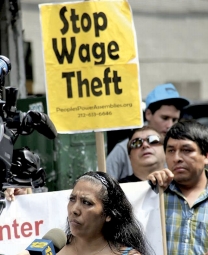
Grassroots Action Grant: Laundry Workers Center works to improve the living and working conditions of low wage laundry, warehouse, and food service workers.
In philanthropy there’s a lot of thought leadership about eliminating questions around evaluation and sustainability because, bottom line, what’s going to make groups sustainable is you giving them more money.
There’s a fairly common misconception: you might assume organizations aren’t meeting outcomes when it’s actually philanthropy that’s fickle and changes its priorities. Philanthropy changes what it wants to give, and then sustainability for groups is endangered based on what portion of resources are tied to, say, an election cycle. So it’s more of a two-way street than people who talk about outcomes realize.
How many applicants do you receive for grant opportunities and what percent of these are you able to fund?
Traditionally, we’ve received around 60 applications a cycle and have been able to fund about 25-30 organizations.
Activist organizations face the burden of fundraising, and it’s philanthropy’s task to lessen that burden by having easier processes through which people apply. A key part of that is having good online application systems. We’ve engaged Submittable so that we can lower the amount of time it takes a group to apply to North Star Fund. This has been really helpful.
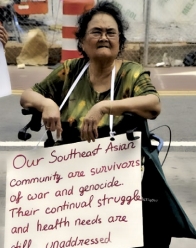
Grassroots Action Grant: Mekong provides critical health and community services to the Southeast Asian community.
We’re also at a place where we’re trying to be transparent in what we’re looking for, so that people who are outside of that fit don’t spend time applying, since we know that every group’s time is precious. And if they do fit, we need to be sure our application process is as simplified and rapid as possible.
Do you see this political moment as being distinct from those that preceded it?
There’s certainly a sense of urgency — many of our communities see this as the fight of their lives. The political landscape has shifted and the campaigns these groups were fighting for now look so much different.
We’re in a space where people’s livelihoods and even basic funding opportunities are being threatened. It looks very different to move a campaign forward when you’re in protection mode, when things are being eliminated.
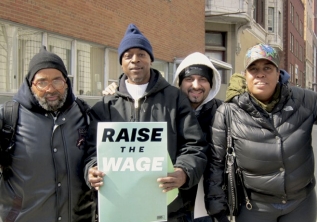
Grassroots Action Grant: Neighbors Together is committed to ending hunger and poverty in Ocean Hill, Brownsville and Bedford-Stuyvesant, three of the lowest-income areas in NYC.
I think it’s also too easy, in political moments, to erase history. It’s easy for people to forget that we used to have certain rights and resources. It’s a new norm now, and it’s a moment where community organizations are fighting so that we don’t have a further rollback in norms.
This is also an opportunity. We saw the Women’s March, people being engaged and politicized and wanting to be a part of how their government is working for and with them. I think it’s really exciting to see people engaged like they never have been before.
The beauty of community organizing and activism is that it will always be relevant. This certainly isn’t the first movement moment that we’ve had. There have been other moments where people turned to the streets.
Our challenge is to move more money to those people, people who are wanting to raise resources and give back. There are so many different community groups out there that you might not have heard of but a place like North Star Fund brings them together.
I think that’s the cool thing about community philanthropy—it’s a great way to get to know your city and see who the groups are that are doing the work in your neighborhood.
Since people might be overwhelmed by the quantity of organizations in need, donating to North Star Fund seems like a good option, given the thoughtfulness of your process and the variety of things you fund.
People do say they know when they’re giving to North Star fund, they’re giving to organizing. The groups we support might change over a span of time, but many donors know they want to support grassroots, community organizations.
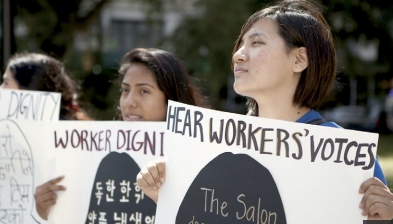
Movement Leadership Grant: Adhikaar serves the Nepali-speaking community. North Star Fund has assisted them in organizing (and empowering) nail salon workers.
What advice do you have for young activists?
I think there is an idea that only certain people can engage in organizing or activism. Also that you can do it, but you can only do it for a little while. I really feel like everyone has something to contribute to the movement.
It’s about figuring out what you’re really good at. For example, what can you spend hours doing, where you don’t even realize time has gone by because you are that good at it or love it that much? That’s going to be your contribution.
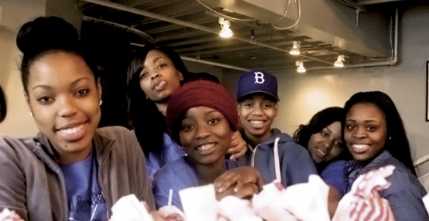
Grassroots Action Grant: The Young Women of Color Health HIV/AIDS Advocacy Coalition trains young women as peer educators on sexual and reproductive health.
For some people, they are going to be really great at tech or communications—there are a whole set of people supporting grassroots that way. Some people excel at finance, so they run a fund for foundations or manage investment portfolios. You could be on a board and serve their finance committee. Or, you can be the person who is out in the streets doing the door-knocking.
We can all be organizers and activists if we believe in a cause and want to contribute to it. You just have to stay engaged and organize within your own community. At the end of the day, I think that’s what activism and organizing is about—building a community.
Do you feel like technology assists in activism and community-building?
Oh, it certainly does, but I don’t think it can replace community. It can help us communicate and organize the work we’re doing in ways that feel more nimble or accessible to people.
We have some grantees that organize young LGBT community members and they’re able to reach so many more folks online because everyone can turn to Facebook or Google and find a group like that. They can plug in and go to that meeting.
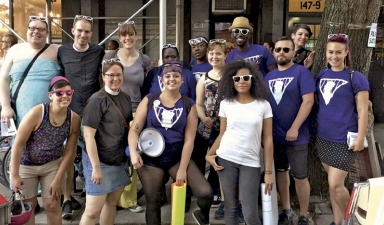
Grassroots Action Grant: The Queer Detainment Empowerment Project seeks an end to long-term solitary confinement and initiate investigation into treatment of LGBTQ immigrants in U.S. custody..
Being in front of the screen doesn’t replace the power that happens when people actually get together, but it’s a great way for us to find each other.
What’s the most challenging part of your job?
Overall, it’s just really clear that there are not enough resources being moved to community organizing. There are always more groups that we would love to fund than we are able to. So our job is to find people who are open to learning about the value of grassroots work and hopefully bring more people into the fold, to invest in and believe in the value of this work. I think for any program officer it’s a challenge—there are just so many great groups out there.
What are some of the major ways that North Star Fund has evolved since 1979 when it began?
In its founding, the organization supported different issue areas. Back in the day, it might have been Central American solidarity work, or apartheid, anti-war work, housing work. Since then, we’ve evolved to really be NYC’s progressive community foundation. As a community foundation, we partner with other foundations and individual donors to raise resources. I think we’ve situated ourselves to be responders and to leverage resources from a greater community to the movement, while still being the place that a local group can turn to for what will probably be their first foundation grant. We have a friendly, open process so folks can get to know us and apply for funding in a way that’s accessible.
**
